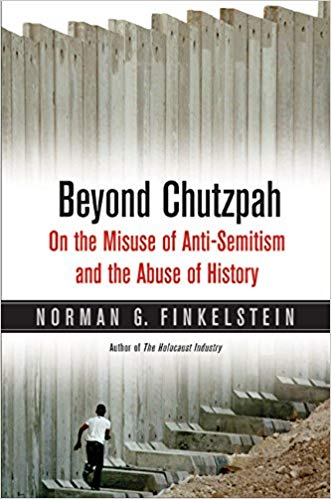Censored Scholar Norman Finkelstein

Beyond Chutzpah, by Norman Finkelstein. 2005
Holocaust Industry and Holocaust Supremacism Condemned
In this book, Finkelstein discusses the decades-old massacre of Arab civilians by Israelis at Deir Yassin as well as larger, lesser-known Israeli massacres of Arab civilians in the early days of the State of Israel (Lydda, 250 victims; Ad Dawayima, “hundreds”; p. 263).
ANTI-SEMITISM! A SILENCING WEAPON
Is anti-Semitism a handy tool? Finkelstein recurrently states that charges of anti-Semitism have been frequently leveled in order to silence valid criticisms of Jews in general and Israeli policies in particular. These charges revolve around the unspoken premise that Jews can do no wrong (e. g., “Holocaust Industry dogma a priori rejects this hypothesis: animus towards Jews can never spring from wrongs committed by Jews.” (p. 78)). Furthermore: “It is even doubtful that agreeing with the statement ‘Jews have too much influence in the world’ proves, as the report claims, anti-Semitism…–anymore than agreeing with the statement ‘White people have too much influence in the world’ or ‘Males have too much influence in the world’ proves, respectively, a racist or sexist cast of mind.” (p. 75). Finkelstein rejects Abraham Foxman’s contention (that the supposedly Jewish-controlled movie industry, inexplicably, seldom acts on behalf of Jews) with the following retort: “Is that why Hollywood has produced a mere 175 films on the Nazi holocaust since 1989?” (p. 83).
HOLOCAUST SUPREMACISM SOUNDLY REJECTED
Finkelstein re-affirms his repudiation of the notion that the Holocaust was “singular, universal, and unique”, comparing it with “the uniqueness and universality of Marxism-Leninism” (p. 49), and dismissing it as follows: “Beyond its repellent chauvinism, this intellectually hollow doctrine of uniqueness serves the useful ideological function of allowing Israel to claim unique moral dispensation: if Jewish suffering was unique, then Israel shouldn’t be bound by normal moral standards.” (p. 62). Furthermore, he writes: “[There is]…an ADL [Anti-Defamation League] poll of the European Union showing that nearly half of the respondents agreed with the statement ‘The Jews still talk too much about the Holocaust.’ Indeed, the wonder is that the percentage of Europeans resenting chauvinistic incantation and political instrumentalization of The Holocaust isn’t much greater.” (p. 74).
Finkelstein asserts that his claims of a Holocaust Industry have never been refuted, at least in writing (p. 67), and he cites Raul Hilberg’s supportive statements towards the same. Finkelstein then repeats his scathing denunciations of the Holocaust Industry itself: “Under the guise of seeking ‘Holocaust reparations,’ American Jewish organizations and individuals at all levels of government and in all sectors of American society entered into a conspiracy—this is the correct word—to blackmail Europe. It was on account of ‘Jewish money’ that the Clinton administration went along with this shakedown operation, providing—even to the detriment of U. S. national interests—crucial support for it at every juncture.” (pp. 82-83). “And just as the Clinton administration promoted the Holocaust reparations scam to get Jewish money and Jewish votes, so the Bush administration undoubtedly supported the new anti-Semitism scam with the same calculations in mind.” (p. 61).
Throughout his book, Finkelstein has strong words against certain individuals. He repeatedly accuses Alan Dershowitz of making false statements on behalf of Israel, and refers to Elie Wiesel as part of the “anti-Semitism circus at the UN” (p. 62). He accuses the ADL (the Anti-Defamation League) of slandering him by calling him “a known Holocaust denier”. (p. 73). He charges Abraham Foxman of the ADL of attempting to censor his book for criticizing Daniel Goldhagen (p. 55), whom Finkelstein elsewhere called a “Holocaust Industry guru” (p. 79). Finally, Finkelstein believes that certain prominent Jews have actually behaved in accordance with the worst anti-Semitic caricatures of Jews: “Yet if Jews act out a Jewish stereotype, it plainly doesn’t follow that they can’t be committing the stereotypical act. Can’t they commit a vile act even if it conforms to a Jewish stereotype?…Should people like Abraham Foxman, Edgar Bronfman, and Rabbi Israel Singer get a free ride because they resemble stereotypes straight out of Der Sturmer?” (p. 83).
MEDIA DARLING JAN T. GROSS AND THE HOLOCAUST INDUSTRY
Jan T. Gross has gotten a great deal of media adulation for his books, in which he alleges that postwar Poles were anxious to rid themselves of all remaining Jews out of guilt over the acquisitions of post-Jewish properties. Finkelstein demonstrates how very shoddy books (which Finkelstein compares to the latest publications of the Flat Earth Society) can even become national best sellers as a result of favorable media coverage (p. 17). Although he does not mention Gross, Finkelstein does expose the absurdity of the bizarre arguments that Jan T. Gross has recently resurrected and placed into a Polonophobic context: “Not only Germans but all Europeans, according to Rosenbaum, were Hitler’s Willing Executioners…Imposing on Jews a state apart, Europeans conspired to ‘get the surviving Jews—reminders of European shame—off the continent, and leave the European peoples in possession of the property stolen from the Jews during the war.’…Before Rosenbaum came along, who would have guessed that the main impetus behind Israel’s creation wasn’t Jews longing for a homeland but Europeans longing to expel them—and to keep their stolen property, no less?” (p. 43).
To see a series of truncated reviews in a Category click on that Category:
- All reviews
- Anti-Christian Tendencies
- Anti-Polish Trends
- Censorship on Poles and Jews
- Communization of Poland
- Cultural Marxism
- German Guilt Dilution
- Holocaust Industry
- Interwar Polish-Jewish Relations
- Jewish Collaboration
- Jewish Economic Dominance
- Jews Antagonize Poland
- Jews Not Faultless
- Jews' Holocaust Dominates
- Jews' Holocaust Non-Special
- Nazi Crimes and Communist Crimes Were Equal
- Opinion-Forming Anti-Polonism
- Pogrom Mongering
- Poland in World War II
- Polish Jew-Rescue Ingratitude
- Polish Nationalism
- Polish Non-Complicity
- Polish-Ukrainian Relations
- Polokaust
- Premodern Poland
- Recent Polish-Jewish Relations
- The Decadent West
- The Jew as Other
- Understanding Nazi Germany
- Why Jews a "Problem"
- Zydokomuna